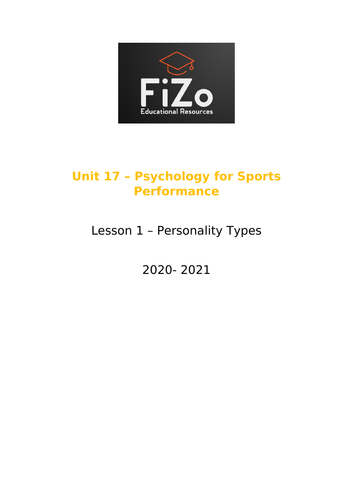



24 slide lesson covering personality types in sports psychology. Content covers.
- Definition of personality in sport psychology
- Type A and B personalities
- Eyesncks view of personality.
Lesson include. - Starter activities
- Subject content
- Progression learning objectives.
- Assessment opportunities
- Differentiation
- Plenary activities
- All required resources
Lessons have been delivered at level 3 BTEC however useable at other levels and programmes.
Something went wrong, please try again later.
This resource hasn't been reviewed yet
To ensure quality for our reviews, only customers who have downloaded this resource can review it
Report this resourceto let us know if it violates our terms and conditions.
Our customer service team will review your report and will be in touch.
£0.00